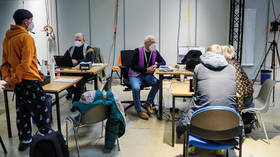UK nation withdraws free services from Ukrainians

The Welsh government has decided to introduce new rules which will scale back benefits fror Ukrainian refugees. The measure comes as the UK government has warned of a difficult fiscal outlook.
Those affected received a letter detailing the new policy from First Minister Mark Drakeford on Thursday, according to state-broadcaster BBC, which said that it could apply to as many as 1,500 people.
Refugees currently staying in hotel rooms, holiday parks, and other temporary accommodation who have been there for five weeks or more must begin to pay their own way and are required to either accept the government’s offer of more permanent housing or face a £25 ($31) weekly fine – £37 ($46) per week for a family of four or larger
While the policy is allegedly not designed to save money, it cuts the offers of free laundry services, toiletries, sanitary products, and even pet food and vet bills. The new policy, the government says, will help refugees “integrate into the community” by encouraging them to arrange for their own clothes to be cleaned and to pay for at least one meal a day.
The rules are set to take effect in January for most parts of Wales, though four councils (Wrexham, Monmouthshire, Conwy, and Blaenau Gwent) are already piloting the accommodation fines. It is meant to address the problems that arose from the UK’s ‘super sponsor visa’ scheme, in which many families were not moved from their initial landing places – or “welcome centers,” which officials warn are often “costly hotels” – into supported placements as fast as the government had hoped.
According to UN data, around 8 million displaced Ukrainians have been recorded across Europe, and 4.8 millions of those are registered with various national protection schemes on the continent.













